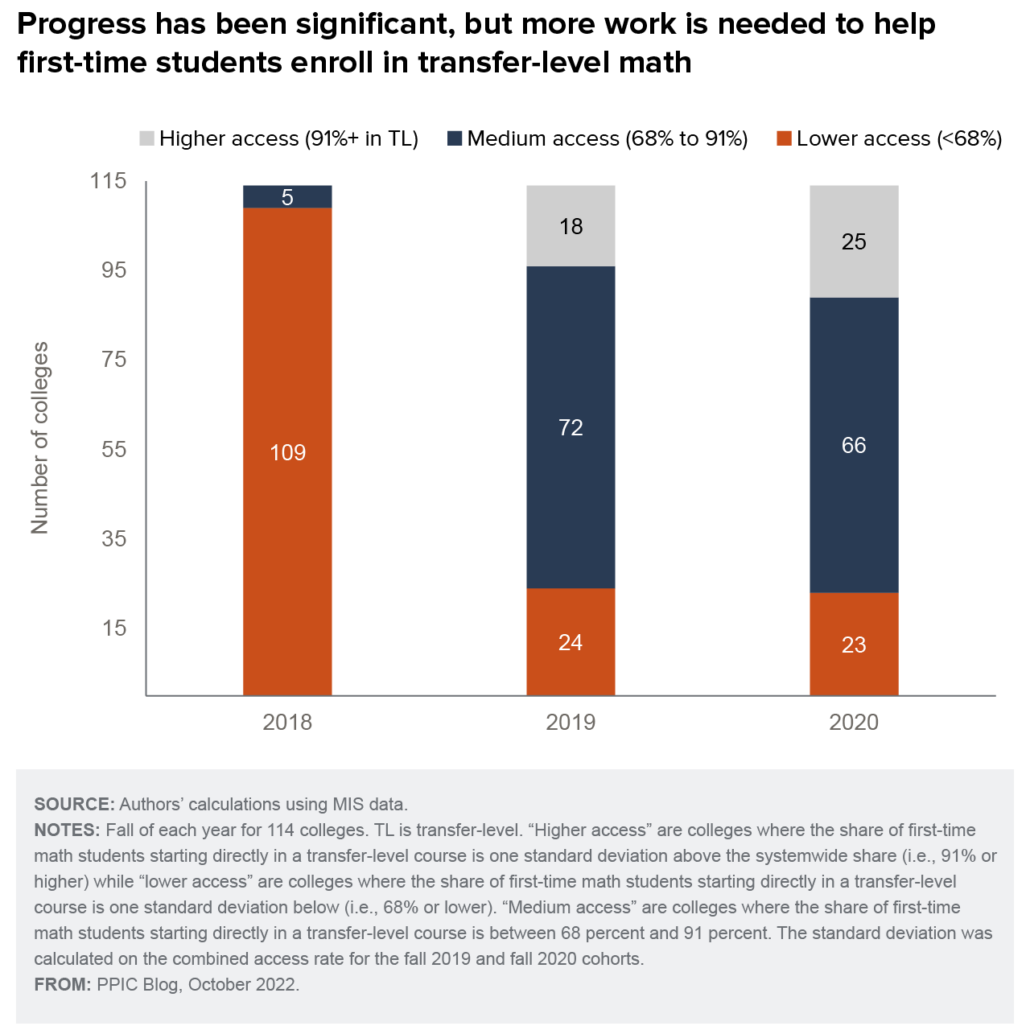Public Policy Institute of California:
Ensuring All Students Benefit from
Landmark Community College Reform
Our “What the CV-HEC” guest blog this month provides commentary on Assembly Bill 1705, borrowed from the Public Policy Institute of California (PPIC) and written by Marisol Cuellar Mejia, Olga Rodriguez and Cesar Alesi Perez. The PPIC, a nonprofit, nonpartisan think tank informs and improves public policy in California through independent, objective, nonpartisan research. The legislation, which builds on AB 705, requires that California’s community colleges expand their efforts to enroll — and support — students in transfer and is aimed at ensuring the final elimination of developmental education in community colleges while developing corequisite support courses to replace them.
By Marisol Cuellar Mejia, Olga Rodriguez, and Cesar Alesi Perez
(October 7, 2022) — Last week, Governor Newsom signed Assembly Bill 1705 into law. This bill requires that California’s community colleges expand their efforts to enroll—and support—students in transfer-level math and English courses. It builds on a previous law (AB 705) that fundamentally reshaped placement and remediation at the community colleges—with progress that has been nothing short of remarkable. Since the implementation of AB 705, community colleges have seen substantial increases in the number of students successfully completing transfer-level math and English courses.
What does the new law do?
At its core, AB 1705 expands the provisions established in AB 705 (2017) by explicitly requiring community colleges not only to place students directly into transfer-level English and math courses but also to ensure that students actually enroll in those courses. Importantly, AB 1705 also establishes that for students who need or desire extra academic support, community colleges shall provide access to such support. The new law clarifies that a community college can require students to enroll in additional concurrent support if it is determined that the support will increase the student’s likelihood of passing transfer-level English or math.
So why was AB 1705 needed? Our research shows that AB 705 implementation has been uneven across colleges and groups of students, especially in math. At one in five colleges, a third or more of first-time math students in fall 2019 were still required or allowed to enroll in below-transfer-level courses, even though many of these students had already taken such courses in high school and had often passed. And when access to transfer-level courses is restricted or discouraged, Black and Latino students, students with disabilities, non- traditional-age students, California Promise Program/Pell Grant recipients, and students with limited English proficiency are more likely to end up in remedial courses. This is problematic considering that the chances of completing a transfer-level course are significantly diminished for those who start below transfer level: only a third of these students subsequently enrolled in a transfer-level course and a fifth successfully completed the course as of the next fall.

The focus on maximizing students’ ability to succeed in transfer-level courses once they are enrolled is essential. Our research shows that there are thousands of students still struggling to complete introductory transfer-level courses. In fall 2019, 49% of first- time math students (54,200 students) started in a transfer- level course but did not successfully complete it in one term. Of those, only 24% successfully completed the course by fall 2020. The record in English is no better. Of the 56,600 students who started in college composition in fall 2019 and were unsuccessful on their first attempt, only 16% successfully completed college composition by fall 2020.
Colleges are still figuring out the best way to provide well-designed concurrent academic supports (including tutoring, “enhanced” transfer- level courses with embedded supports, and low-unit or noncredit corequisites) in a way that takes into account the wide diversity of student needs as well as concerns over increased student and faculty workloads. Currently, only about one in five first-time math/English students start in a transfer-level course with corequisite support or in an enhanced course, and many colleges have yet to offer such forms of support. Given the wide variation in student outcomes across colleges, even among those implementing the same support structures, a statewide emphasis on the implementation of robust, well-designed, and research-backed supports is crucial.
These supports also need to be fully resourced so that colleges can properly identify students who may benefit, expand effective programs, and provide professional development for faculty. The $64 million allocated in the 2023 state budget should help community college faculty and administrators implement the remedial education reforms laid out in AB 705 and AB 1705.
For these bills to meet their full potential to accelerate successful completion and help narrow racial equity gaps, colleges must put in place better systems to make sure struggling students do not fall through the cracks but are instead provided with the support they need to succeed. This may mean expanding the scope of outreach and support beyond academic needs. Our research finds that students who are not successful under the new system are struggling with more than just English or math—such students are earning a relatively low share of their attempted units and, consequently, have low GPAs in the rest of their courses too. A holistic approach, one that meets students’ needs within and outside of the classroom, could help address the systemic challenges faced by students and maximize their chances of academic success.
See original PPIC blog.





